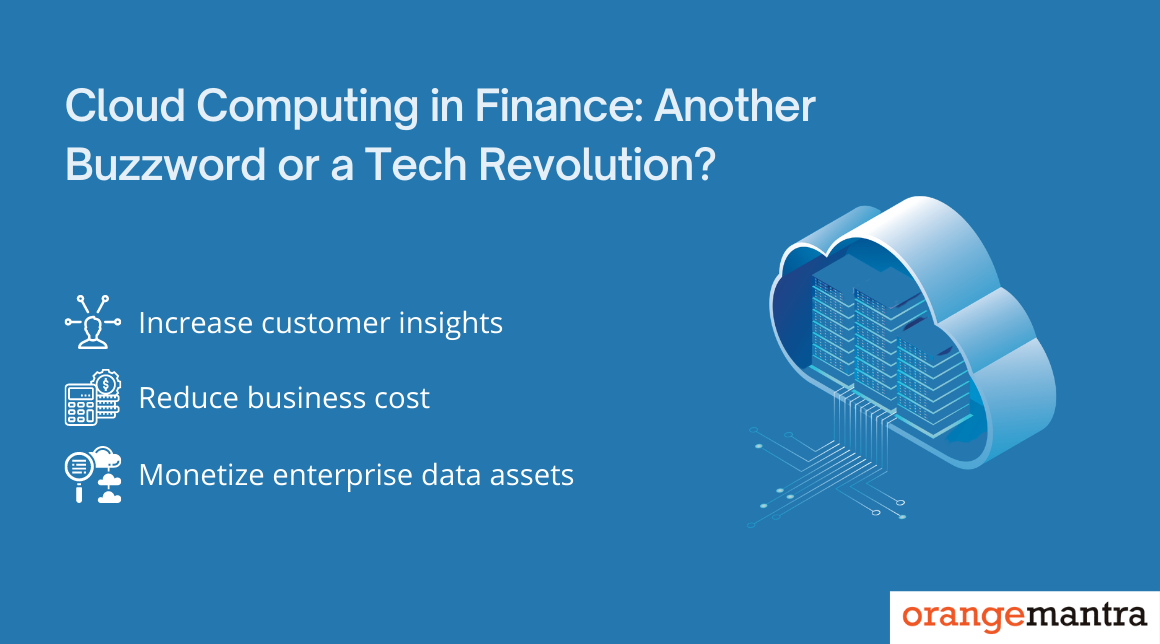Over the recent years, cloud computing has played a vital role in innovation and service development. It has allowed industries to tap into new service models, utilizing advanced technologies. Ultimately, catering new and more reliable services/products to their customers, improvise productivity, cost-efficiency, and flexibility in performing in-house business workflow.
More recently, the COVID-19 pandemic has intensified the need for financial firms to get more agile and compliant. A number of financial services companies, for example, have implemented cloud technology in the KYC verification process. Besides, most banks and financial institutions today rely on cloud-based digital infrastructure for their day-to-day operations.
In this blog, we will analyze the trends that transformed the finance sector. Keep reading to understand how the cloud has revolutionized financial services while offering an array of technological advantages.
The New Face of Financial Sector with Cloud
With a drastic change in consumer expectations, emerging technologies, and alternative business models, banks are compelled to put their strategies in place and get future-ready. The leading cloud service providers offer an array of innovative product-as-a-service accessed by various platforms. It helps banks implement business and its operating models to:
- Enhance revenue generation
- Increase customer insights
- Reduce business cost
- Deliver products as per customer’s requirement
- Monetize enterprise data assets.
Above all, Cloud computing offers grand opportunities for financial firms to synchronize their data to break down data silos across risk, regulatory, customer support and more. Once the entire enterprise’s data is collected in one place, it can easily be analyzed for integrated data insights.
How banking leaders can leverage the cloud for business frontiers
Fundamentally, the cloud has changed the way we know business technologies in the past. Technology, today, is not just referred to as a cheaper means for work functions, but it has freed financial firms from daunting administrative tasks. As a result, the finance sector has now won time from mundane tasks and implements strategies to create more digital transformation opportunities.
The significant move from in-house servers to cloud solutions is not any random technical upgrade. It is a revolution that will redefine and transform the world of finance.
For business leaders, cloud computing is a clear opportunity to ensure that it will accelerate their digital transformation journey. Here are the benefits of implementing cloud solutions for financial firms:
Reduced IT cost and workloads
A recent survey states that “more than 90% of an IT budget gets spent on maintenance.” It means, only 10% of the total budget drives innovation and business process improvement. Moving the entire server to the cloud enables the industry to reduce its IT expense. It focuses on adopting new financial initiatives such as revenue recognition and optimizing business work operations.
Remote Access
Due to the pandemic, an increasing number of financial firms has shifted to remote work culture, which has given a substantial boost to cloud adaptation. By implementing all the correct safety protocols and a good internet connection, one can access the data and systems, irrespective of their location. Thus, it accelerates the decision-making process, enabling flexibility and agility with more cost-effective solutions.
Reduced IT cost and workloads
A recent survey states that “more than 90% of an IT budget gets spent on maintenance.” It means, only 10% of the total budget is allocated to drive innovation and business process improvement. Moving the entire server to the cloud enables the industry to reduce its IT expense. It focuses on adopting new financial initiatives such as revenue recognition and optimizing business work operations.
Remote Accessibility
Due to the pandemic, many financial firms have shifted to remote work culture, which has given a substantial boost to cloud adaptation. By implementing all the correct safety protocols and a good internet connection, one can access the data and systems, irrespective of their location. Thus, it accelerates the decision-making process, enabling flexibility and agility with more cost-effective solutions.
Speed & Accuracy
Moving your entire finance operations on the cloud can speed up routine tasks and process more data than ever. Also, vital process automation helps prevent duplication and human errors, thus saving time, effort, and money. For updated and accurate financial records, the cloud streamlines the entire data for effective functioning and analysis.
Improved Collaboration
According to a survey, 64% of the bank leaders admitted that cloud-based collaboration tools have helped their organization drive more efficiency and execute plans faster than ever. While handling the clients, suppliers, and finance team, cloud-based solutions help the team access documents at any location. It means the cloud-based tools update your data in real-time with enhanced visibility.
Effective Automation
Cloud-based tools are real-time savers. For instance, the core tasks such as data input and financial reporting get achieved in a short period. The repetitive tasks get automated, unlocking valuable resources to empower leaders to focus on the areas with real business value.
Final Thought
In the post-pandemic market, the finance sector still has many challenges to conquer. But the good news is, they also have tremendous business opportunities to transform. While navigating new approaches, cloud-based tools and technology will help them deliver strategic objectives. Also, it will save costs wherever possible to balance business continuity and financial resilience. Embracing new technology is crucial for the finance sector to increase efficiency, drive decision-making, and support overall growth. Bank leaders need to ensure that the finance function doesn’t go back to the “traditionalist” way rather than the modern way.
FAQs
What is Cloud Computing?
In simple words, Cloud computing is a new technology for storing data over the internet. It’s a hybrid technology where you can compute servers, software, networking, storage, databases, analytics, and more on the internet.
How to find the best cloud service provider?
OrangeMantra offers world-class cloud computing solutions customized as per the customer’s business requirements. From creating custom cloud-based applications to confirming seamless migration to Google Cloud, we take care of the entire IT demands of an organization. Our seasoned Google cloud developers implement customized Cloud solutions designed to meet the usage and process workflows of the client’s business. To learn more about our cloud services and programs, hire cloud developers or visit our website https://www.orangemantra.com/services/google-cloud-platform-solution/
What are the advantages of moving to the cloud?
- Flexibility to increase or decrease the business power
- It’s a “pay as you go” service. You need not worry about replacing the servers ever again
- Hybrid feature – Both on-premises and cloud environments work together
- 24×7 availability and customer support
- Enterprise-level security; Big or small, every company will receive the same level of data security.






















